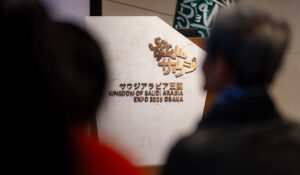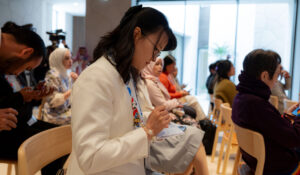
- ARAB NEWS
- 18 Aug 2025

RIYADH: Saudi Arabia is advancing with unwavering confidence toward a brighter future, honoring its deep-rooted cultural legacy while drawing strength from an ambitious vision for a sustainable cultural sector, the CEO of the Saudi Cultural Development Fund said at Expo 2025 Osaka.
Majed bin Abdulmohsen Al-Hugail virtually took part in a panel discussion, titled “Creative Sustainability: Investing in Culture with Long-Term Impact.”
The Saudi Cultural Development Fund is committed to driving long-term impact and sustainable growth within the cultural sector through innovative solutions and strategic partnerships between the public, private, and nonprofit sectors.

Through pioneering solutions, the fund is contributing to turning Saudi Arabia’s cultural sector into a powerful economic force, while also fostering long-term sustainability — fully aligned with the ambitions of Vision 2030.
Al-Hugail emphasized the economic power of culture, saying that true investment extends beyond infrastructure or innovation alone and lies in securing the cultural sector’s lasting vitality within the economy.
By embracing visionary sustainable strategies, culture evolves into a living, breathing force, one that fuels economic prosperity, nurtures creativity, and weaves a stronger, more resilient social fabric.

During the panel discussion, Al-Hugail said: “At the Saudi Cultural Development Fund, sustainability is not just a goal; it is at the core of everything we do. Our approach is guided by key indicators that align with global Environmental, Social, and Governance standards.”
In pursuit of economic sustainability with lasting positive social impact, the Saudi Cultural Development Fund focuses on supporting businesses that build capabilities.
A notable example is the fund’s backing of the “CHEFPreneur” program, which has equipped 42 Saudi women with culinary and entrepreneurial expertise, empowering them with the skills to start their businesses in the culinary sector.
The panel also explored sustainable business models in the cultural sector. As funding landscapes continue to evolve globally, the sector is turning to innovative alternatives. This new wave of cultural financing includes emerging models such as public-private partnerships, which play a key role in fostering an economically sustainable cultural sector.
As an example, the fund has forged a pioneering collaboration with several leading Saudi banks and the Saudi Credit Bureau to strengthen its offerings and enhance the efficiency of credit decision-making processes.
Demonstrating its commitment to sectoral growth, the fund also contributed 40 percent to the $100 million Saudi Film Fund, aimed at expanding the Kingdom’s film industry, attracting private sector investment, and driving the sector’s long-term development.
Last year, the fund launched “Cultural Financing,” an inclusive umbrella of financial services designed to support micro, small, and medium-sized cultural enterprises across all stages of the value chain — fostering the growth and expansion of cultural projects.
Al-Hugail concluded the panel discussion by saying: “Through international exhibitions like Expo 2025 Osaka, visitors can experience Saudi Arabia’s rich cultural diversity and preview a forward-looking vision of the country’s future.”
He added: “The Kingdom’s participation at Expo 2025 Osaka is bringing the best of Saudi Arabia to the world stage and providing an opportunity for the world to witness Saudi Arabia’s remarkable transformation.”
The fund is taking part in Expo 2025 Osaka within the Saudi Arabia Pavilion, highlighting the Kingdom’s strategy to position culture as a major economic force while ensuring its sustainable growth.
This aligns with both the National Cultural Strategy and Vision 2030, which focus on diversifying the national economy, with the fund serving as a primary financial enabler for the cultural sector.